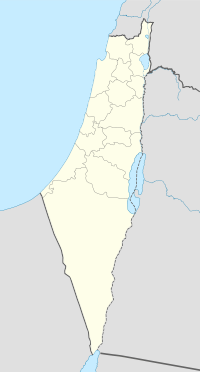Al-Mujaydil
| al-Mujaydil | |
|---|---|
| Arabic | المْجيدل |
| Name meaning | The little watch-tower |
| Subdistrict | Nazareth |
| Coordinates | 32°40′40.29″N 35°14′30.53″E / 32.6778583°N 35.2418139°ECoordinates: 32°40′40.29″N 35°14′30.53″E / 32.6778583°N 35.2418139°E |
| Palestine grid | 173/231 |
| Population | 1,900 (1945) |
| Area | 18,836 dunams 18.8 km² |
| Date of depopulation | 15 July 1948 |
| Cause(s) of depopulation | Military assault by Yishuv forces |
| Current localities | Migdal HaEmek, Yifat |
Al-Mujaydil (Arabic: المْجيدل (also: al-Mujeidil) was a former Arab-Palestinian village located 6 km southwest of Nazareth. Al-Mujaydil was one of a few towns that achieved local council status by the Mandatory Palestine government. In 1945, the village had a population of 1,900 and total land area of 18,836 dunams – mostly Arab-owned. The population was partly Christian and the town contained a Roman Catholic church and monastery.
Traces of a Roman road was found close to the village, which may indicate that the region was opened to intensive settlements as early as Roman times.
In 1596, Al-Mujaydil was part of the Ottoman Empire, nahiyah (subdistrict) of Tabariyya under the Sanjak Safad, with a population of 4 Muslim families. It paid taxes on wheat and barley, fruit trees, as well as on goats and beehives. In 1799 it was named Magidel in the map of Pierre Jacotin.
C.R. Conder, of The Survey of Western Palestine, camped by the place in the 1870s, and described the village as a place being visited by missionaries. The village was also described as being "flourishing", and built of stone and mud. It was on the northern side of a small plateau, and olive groves were cultivated to the south and to the east. The population size was estimated at 800 (in 1859), and they cultivated 100 faddans.
In 1882, Grand Duke Sergei Alexandrovich of Russia, the brother of the Russian Tsar, visited the village, and donated money for the construction of a Russian Orthodox Church there in the hope that local Christians would be converted to the Orthodox faith. However, the Patriarch of Jerusalem Nikodim opened the church to all denominations in the village and ensured it functioned most of the time as a village school.
...
Wikipedia

